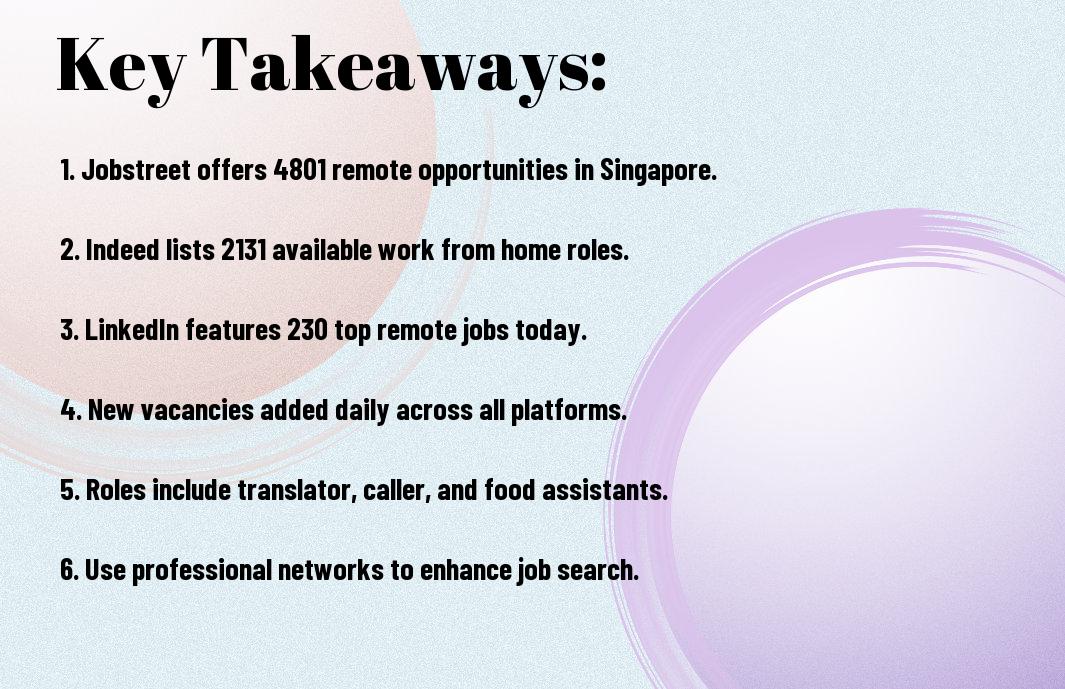Over the past few years, working from home has become increasingly popular, and if you’re in Singapore, there are plenty of opportunities waiting for you. I’m excited to share some easy ways to find the perfect work-from-home job. With platforms like Jobstreet showcasing over 4,801 vacancies and Indeed and LinkedIn offering countless options, you’re sure to discover a role that suits your skills and lifestyle. Let’s explore these resources together and get you started on your work-from-home journey!

Understanding Work-From-Home Jobs in Singapore
Your journey into the world of remote work begins with understanding what work-from-home jobs actually entail. These are roles that allow you to complete your tasks from the comfort of your own home rather than commuting to a traditional office. With the rise of digital communication and technology, a wide range of positions can now be carried out remotely, spanning various fields and industries. The flexibility that comes with these jobs can be highly appealing, especially for those seeking a better work-life balance.
What are work-from-home jobs?
To put it simply, work-from-home jobs refer to positions where employees can perform their duties remotely, often utilising their personal computers and internet connections. Such jobs range from customer service roles to creative positions like writing and designing. The diversity of available jobs means that there is something for nearly everyone, catering to a variety of skills and experience levels. This flexibility makes it easier for you to tailor your work environment to suit your preferences, ultimately contributing to increased productivity.
Benefits of Working from Home
Besides enjoying a more flexible schedule, working from home significantly reduces commuting time, allowing you to spend more time on personal interests or family. This can lead to a happier and more productive life, as daily stress levels are often lowered without the hassle of a daily commute. Additionally, you can create an optimal workspace that reflects your personal tastes, making it a more enjoyable place to get your work done.
From financial savings on transport to the possibility of a better work-life balance, the advantages of remote work are substantial. Many people find they can save quite a bit on daily expenses, such as meals and travel. Moreover, the ability to manage your own time often results in increased efficiency, making it an attractive option for many job seekers.
Popular Industries for Remote Work
Home to a thriving job market, Singapore showcases various industries keen on embracing remote work. Fields such as IT, marketing, customer service, and education are witnessing a surge in opportunities for remote positions. Whether you’re looking to work as a software developer, an online tutor, or even in sales, there are numerous options available for anyone interested in this mode of career. This flexibility opens up new avenues for both seasoned professionals and newcomers alike.
Also, the increasing trend of remote work is evident across many sectors beyond technology and education. Creative industries, such as design and content creation, are flourishing with remote opportunities. Additionally, the hospitality sector, often requiring face-to-face interaction, has begun to adapt and offer roles such as virtual event planning and remote guest relations, further broadening the scope for remote employment in Singapore.
Top Job Platforms for Remote Opportunities
There’s no doubt that the rise of remote working has opened up a wealth of possibilities for those of us seeking flexible job options. One of the standout platforms I highly recommend is Jobstreet. It’s a robust resource with a dedicated section for work-from-home jobs, specifically in Singapore. Around 4,801 remote positions can be found on this site, showcasing a diverse range of roles that could fit your skills and interests perfectly. The user-friendly interface allows you to search easily, and with new jobs being added daily, you’ll surely find something that piques your interest.
Jobstreet
Around Jobstreet, I’ve found that the platform does an excellent job of catering to the Singapore market. Whether you’re looking for part-time positions, full-time roles, or freelance opportunities, there’s something for everyone. You can apply filters to narrow down your search based on location, industry, and even company size, making it easier to find your ideal match!
Indeed
Across the web, Indeed is renowned for its extensive list of job postings, and their Work From Home section is no exception. With over 2,131 positions currently available, I believe it’s one of the first places you should visit when searching for remote work in Singapore. This platform features roles ranging from translator to food and beverage assistant, ensuring that there’s a wide array of opportunities to choose from.
Due to its user-friendly design and comprehensive search options, applying for jobs through Indeed is a breeze. You can easily upload your CV, set up job alerts, and tailor your job search to align with your skills and experience, which is really handy!
Navigating through LinkedIn can significantly enhance your chances of securing remote work. With today’s top 230 work-from-home positions listed, it’s an excellent place to leverage your professional network and get noticed by potential employers. You can also join groups and connect with like-minded individuals who share similar career interests, which might open up unforeseen opportunities.
A little bit of networking can go a long way on LinkedIn. By engaging with your connections and showcasing your expertise, you increase your chances of being approached for remote work opportunities tailored just for you. Plus, the platform often highlights job openings at companies that align with your existing network, making it a clever way to tap into the hidden job market.
Types of Work-From-Home Jobs Available
Now, let’s explore the various types of work-from-home jobs you can find in Singapore. It’s interesting to note that there are numerous opportunities available that cater to different skill sets and preferences. Here’s a quick breakdown:
| Type of Job | Description |
| Customer Service | Assist customers with inquiries and support. |
| Content Writing & Translation | Create written content or translate documents. |
| Digital Marketing | Manage online marketing strategies. |
| Tech and IT | Provide technical support or develop software. |
| Education & Tutoring | Teach or tutor students online. |
Perceiving the variety of job options available, you can logically choose one that resonates with your skills and passions.
Customer Service Roles
Below, customer service roles are incredibly popular for those looking to work from home. These positions often involve assisting customers over the phone, via email, or through chat. Your key responsibility would be to resolve issues, answer questions, and provide information regarding products and services. I find that these roles can be quite rewarding since you get to interact with people and help them solve their problems.
In my experience, customer service positions often require excellent communication skills and a patient demeanor. Many companies look for candidates with experience in retail or previous customer support roles, although there are entry-level opportunities available as well. Training is usually provided to help you become familiar with the products and services you’ll be supporting.
Content Writing and Translation
With the rise of online content consumption, content writing and translation jobs have become increasingly sought after. These roles typically involve creating, editing, or translating various forms of written material, such as articles, blogs, marketing materials, and more. I love the creativity involved in writing, and it can be particularly fulfilling to see my words published for a wider audience.
Your expertise in a specific area or language can significantly enhance your prospects in this field. Many companies are searching for talented writers who can create engaging content or translators who can bridge the language gap in their communications. Whether you have a flair for storytelling or a keen linguistic ability, opportunities abound.
Translation is a field that offers diverse paths, from literary translation to technical documentation. If you’re bilingual or multilingual, you’ll find that many organisations are eager to work with you to ensure accurate communication across language barriers. Specialising in a particular industry, like legal or medical, can also open doors to higher-paying projects.
Digital Marketing Positions
Content-wise, digital marketing positions are thriving as businesses shift to online strategies. These roles can include social media management, search engine optimisation (SEO), and online advertising campaigns. As someone who enjoys analysing trends and consumer behaviours, I find digital marketing to be an exciting and vibrant field to work in.
Landing a position in digital marketing often requires an understanding of various tools and platforms. You may need skills in analytics and content creation to develop effective marketing campaigns. The digital landscape is always evolving, which means continuous learning is important, but it can be well worth the investment.
Types of digital marketing roles also vary widely, including positions for content strategists, SEO specialists, and social media analysts, among others. Each role ensures you’re using creative and analytical skills that keep the work dynamic and engaging.
Tech and IT Jobs
Jobs in tech and IT are incredibly versatile and can range from software development to IT support. Many companies are offering remote work opportunities to tap into a global talent pool. I personally find tech roles satisfying, as they often allow you to solve complex problems and innovate in your field.
These positions may require specific skills in programming languages, software development, or networking, depending on the role. Freelancing is also an option here, with many IT professionals choosing to work on a project basis to suit their lifestyle. As technology continues to evolve, the demand for skilled IT professionals is likely to remain strong.
Writing code, troubleshooting issues, or designing systems—whatever your expertise in tech, there’s likely a position that fits your skills and interests.
Crafting Your Application for Remote Jobs
Many people wish to transition to remote work, and one of the most important steps in this process is crafting your application. Your resume and cover letter are your first chances to impress potential employers, so it’s vital to get them right. With the right approach, you can highlight your skills and suitability for remote work, making yourself stand out in the job market.
Writing a Standout Resume
About your resume, I believe it should be tailored specifically for remote positions. Highlight any experience that showcases your ability to work independently and effectively without direct supervision. Be sure to include relevant skills such as time management, digital communication, and self-motivation, and look to provide concrete examples of past achievements. A clean, organised layout can make a great first impression, so ensuring your resume is easily readable is key.
Creating a Compelling Cover Letter
Around the cover letter, I understand that this is your opportunity to add a personal touch to your application. Use it to convey your passion for remote work and explain how your skills align with the demands of the position. It’s a brilliant moment to demonstrate your personality, but also to discuss how you can contribute to the company’s goals. Make sure to research the company and reflect its values in your letter.
The best cover letters are those that highlight your unique qualifications while addressing the specifics of the job description. By expressing enthusiasm and showing that you truly understand the role, you’ll make a lasting impact. It’s the perfect chance to weave in anecdotes that illustrate your commitment and adaptability in a remote work environment.
Preparing for Remote Interviews
Remote interviews can be quite different from traditional face-to-face meetings, so it’s important to be well-prepared. I always make sure to test my technology in advance, especially my internet connection and any software we’ll be using, like video conferencing tools. Dressing professionally and selecting an appropriate location can elevate your presence, making you look and feel more confident.
Jobs in remote settings often require a different kind of engagement, and it’s vital to practice articulating how your experience and skills make you an excellent fit for the role. Practicing common interview questions and preparing thoughtful questions to ask the interviewer can show your interest and enthusiasm for the position.
Jobs can be quite competitive, so staying authentic and conveying your personality during the interview can genuinely set you apart. A friendly smile and a positive attitude can go a long way in making a connection with the interviewer, even through the screen.
Staying Motivated While Working from Home
Not only is working from home a great way to enjoy flexibility in your day, but it potentially comes with its own set of challenges. Staying motivated can be a struggle, especially when the temptation of your bed or the distractions of household chores loom large. However, there are effective strategies that can help keep your motivation levels high and make your work-from-home experience enjoyable and productive.
Setting Up a Productive Workspace
About the workspace you create for yourself—its design and functionality can significantly impact your productivity. I always find it helpful to have a dedicated area where I can focus solely on work. This doesn’t mean you need a home office, but carving out a specific corner or room can create a mental divide between work and leisure. Adding elements that inspire you, such as plants, artwork, or even a comfortable chair, can make a big difference in how I feel while working.
In addition, ensuring that my workspace is equipped with all the tools I need, from a reliable internet connection to stationery, allows me to work more efficiently. It’s important to keep this area tidy and organised—it helps me to minimise distractions and promotes a mindset geared towards productivity.
Managing Your Time Effectively
Above all, managing my time wisely is important for staying on track with my tasks. I’ve found that creating a daily schedule helps me prioritise what needs to get done. By setting specific working hours, I can maintain a routine similar to what I would have in a traditional office. Using techniques like the Pomodoro Technique, where I work in focused bursts followed by short breaks, helps me stay fresh and engaged.
From my perspective, it’s also important to evaluate how I spend my time. I occasionally review my productivity levels during the week, assessing which tasks take longer than expected or if I’m getting sidetracked. Adjusting my schedule accordingly is a simple yet effective way to ensure my time management is always improving.
Maintaining Work-Life Balance
At the end of the day, achieving a healthy work-life balance is vital. I strive to set clear boundaries around my working hours, ensuring that once I finish for the day, I can switch off and engage in activities that I enjoy. Whether it’s spending time with family or indulging in a good book, these moments of relaxation are important for recharging my batteries and keeping my motivation levels high.
Furthermore, by recognising the importance of downtime, I am less likely to experience burnout. I’ve learnt that it’s perfectly okay to step away from my desk and enjoy some leisure time. This balance ultimately enhances my productivity and keeps me motivated during work hours.
Home is where I feel most comfortable, and embracing the blend of work and personal life allows me to thrive in a work-from-home environment.
Resources for Remote Workers in Singapore
Despite the challenges of working remotely, there are numerous resources available to help you thrive as a remote worker in Singapore. Whether you’re new to the work-from-home scene or looking to expand your network, these tools and communities can provide support and guidance that you may find beneficial.
Online Communities and Forums
At times, it can feel isolating to work from home, but there are thriving online communities where you can connect with like-minded individuals. Platforms such as Facebook, Reddit, and even local forums often host groups specifically for remote workers in Singapore. Engaging in these communities allows you to share experiences, seek advice, and discover job opportunities that you may not find on traditional job boards.
Moreover, these online spaces often host discussions about best practices, tools for efficiency, and coping mechanisms for dealing with the unique challenges of remote work. I find that simply sharing my journey and challenges can lead to insightful conversations and sometimes even collaborative opportunities.
Training and Skill Development Platforms
To remain competitive in a remote job market, I believe it’s necessary to continually develop your skills. There are several platforms, such as Coursera, Udemy, and LinkedIn Learning, that offer a wide range of courses tailored to enhance your abilities in your field of interest. These platforms make it easy to learn at your own pace and often provide certification upon completion, which can be a fantastic addition to your CV.
But embracing lifelong learning not only helps you advance your career but also keeps your mind engaged and motivated. I often spend weekends exploring new topics or honing specific skills that could be valuable in future job applications. This investment in myself pays off in the long run, as I feel more confident and prepared for any role that comes my way.
Government Support and Schemes
An important aspect of building your remote career in Singapore is utilising the support offered by the government. Various initiatives and schemes are in place to help individuals adapt to the changing workplace landscape. This can include grants for upskilling, advisory services, and even job placement assistance designed specifically for those seeking remote work opportunities.
A significant scheme worth exploring is the Adapt and Grow programme, which aims to help job seekers transition to new industries and roles. By tapping into these resources, you can enhance your skill set and increase your chances of landing that ideal work-from-home job.
So, if you’re on the hunt for work-from-home jobs in Singapore, you’re in luck! Platforms such as Jobstreet, which showcases over 4800 opportunities, and Indeed, which features an impressive 2131 roles, make it easy to find your perfect job. I find it incredibly convenient to browse through these listings, apply for positions that match my skills, and keep track of new openings daily. The variety of roles available—from translators to food and beverage assistants—means there’s something for everyone, no matter your background or expertise.
You can also tap into your professional network on LinkedIn, where you can discover today’s top work-from-home vacancies. I appreciate how easy it is to connect with potential employers and explore fresh opportunities. As someone who values flexibility and work-life balance, finding a suitable remote job that aligns with my expectations has been a rewarding experience. So, don’t hesitate to explore the world of remote working; your ideal job might just be a few clicks away!
FAQ
Q: What are the best platforms to find work-from-home jobs in Singapore?
A: The best platforms include Jobstreet, which lists 4801 work-from-home jobs; Indeed.com, featuring 2131 available positions; and LinkedIn, showcasing the latest top 230 work-from-home jobs. These sites frequently update their listings with new opportunities.
Q: What types of work-from-home jobs are commonly available in Singapore?
A: Common work-from-home job positions in Singapore include roles such as translator, caller, food and beverage assistant, customer service representative, and various administrative or freelance positions. The variety allows job seekers to explore opportunities that match their skills and interests.
Q: How can I effectively apply for work-from-home jobs online?
A: To effectively apply for work-from-home jobs, ensure your CV and cover letter are tailored to each position. Highlight relevant experience and skills that align with the job requirements. Additionally, make use of keywords from the job listings to make your application stand out and increase the chances of being noticed by recruiters.
Q: How often are new work-from-home jobs posted on these platforms?
A: New work-from-home jobs are added daily on platforms like Jobstreet, Indeed, and LinkedIn. Frequent checking of these websites will keep you updated and allow you to apply promptly for the latest opportunities that interest you.
Q: Are there any specific skills needed for work-from-home jobs?
A: While the required skills vary by position, many work-from-home jobs value strong communication skills, time management, self-motivation, and proficiency with technology. Depending on the role, additional skills such as data entry, customer service, or language proficiency may also be beneficial.









